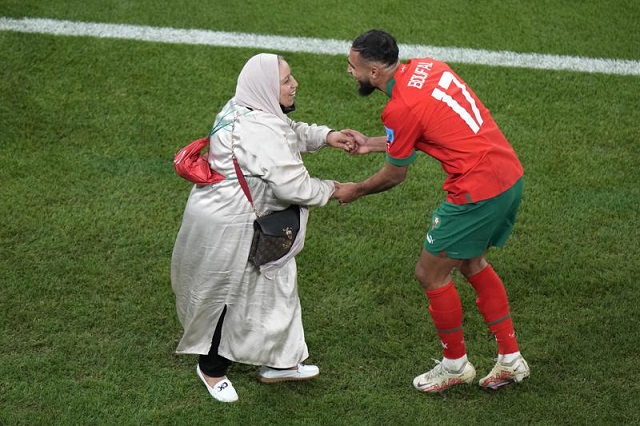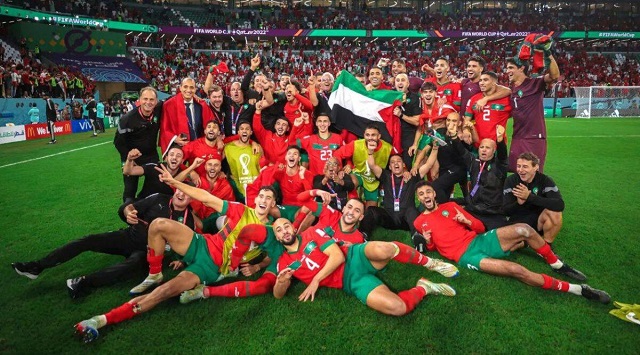Analysis | Echoes From the World Cup: Morocco and the Politics of Belonging
New in Ceasefire - Posted on Friday, January 6, 2023 10:30 - 0 Comments
By Maha Marouan

Sofiane Boufal celebrates with his mother after Morocco’s historic victory over Portugal, 10 December 2022. (Credit: AP/Luca Bruno)
As the first African team to reach the semi-finals in the history of the World Cup, the Moroccan football team became a global phenomenon, bringing attention to a country and a continent that have been historically undermined and underrepresented in the world of football.
The Moroccan team did not just win the support and admiration of football connoisseurs; they also stole the hearts of those who are outsiders to the sport through their open and spontaneous display of love towards each other and towards their families. The world watched as they ran to embrace their mothers after every match—an open testimony to the importance of these woman in their lives.
The bold choice of the bi-national members of the team to play for Morocco, their ancestral home, instead of the more prestigious European teams of their countries of birth also articulates a deeply rooted commitment to their African roots, making them role models for many young bi-national African players in Europe who now aspire to use their talent to advance the game in the continent.
A resounding question about who the Moroccan team victory really belonged to was being vociferously discussed everywhere. Did it belong to Moroccan Jews? To Palestinians? To Africans? To Arabs?
Images of both Palestinians and Moroccan Jews in Israel singing and dancing in the streets, or in front of their TVs in support of the Moroccan team saturated the media and shocked the U.S. and the world. Many Arabs were offended because the Moroccan coach said his team represents Africa first (and not the Arab World), and many Africans were offended because one of the players said the team represents the Arab world and neglected to mention Africa.
By the same token, some Arabs criticized the team for not being ‘Arab enough’ and frowned upon the public show of affection exhibited by the players towards their mothers, especially Sofiane Boufal who was dancing with his mother in the stadium. Many Africans stated that Moroccans do not really consider themselves Africans and hence do not deserve their loyalty. Some Moroccan Jews were offended by the presence of the Palestinian flag at the games and many Palestinians were offended by the closer ties the Moroccan government has established with Israel.
As a Moroccan woman and scholar, these nuanced reactions and responses had me glued to the TV and to media outlets, watching every game, absorbing hundreds of posts and comments even though I have always avoided football because of the kind of patriotism it incites in people. News coverage transcended the Moroccan team and quickly moved into a debate over who Moroccans are and who they, in fact, represent.
Morocco is a place with many identities that has always operated as a crossroad because of its unique geographic location. It is part of the Arab-speaking world, a member of the Arab league, and has historically supported the Palestinian cause. It is also an African country – one of the founders of the African Union – with a long history of Pan-Africanism. Furthermore, it is a country of Muslims and Jews that has never lost its ties to its Jewish diasporas around the world.
It is perhaps this last part of Moroccan history that gets often erased in public discourses. What most people in the U.S. do not know (except for Sephardic Jews) is that Morocco is one of the few countries in the Arab-speaking world to have always protected its Jewish communities. In the 1940s, when France fell to the Nazis, the Vichy regime failed to impose antisemitic laws in Morocco. Despite immense pressure, the late King Mohamed V (grandfather of the current king, Mohamed VI) refused to allow the deportation of Moroccan Jews, which was not the case in neighbouring countries. He declared that there are no Jews and Muslims in Morocco, only Moroccans.
Even after the foundation of Israel in 1948, the king continued to publicly remind everyone that Moroccan Jews will always be Moroccan. The heavy emigration of Moroccan Jews to Israel in the decades since, combined with a growing nationalism, led to the diminishing of Moroccan Jewish communities—a loss that was felt and suffered by both Moroccan Muslims and Jews.
But to this day, Morocco remains the centre of worship for Moroccan Jews from all over the world because of the large numbers of synagogues, cemeteries, and sanctuaries all over the country. Given this history, the support and excitement of Moroccan Jewish diasporas towards the Moroccan football team, either in Israel, or around the world, is not something that has taken us Moroccans by surprise.
We are also an African nation with religious and linguistic ties to the Arab world, but we are not ethnically Arab — which is an important distinction. We are historically an Amazigh people who have inhabited North Africa for millennia and have ancestral ties to the Sahel and West Africa. The compartmentalisation of the continent into ‘North Africa’ and ‘sub-Saharan Africa’ was a colonial invention that remains historically inaccurate and suppresses Morocco’s strong linkages to the rest of the continent.
Academia in the he U.S. unfortunately contributed to the de-Africanisation of North Africans who continue to get labelled as ethnically Arab and part of the Middle East in U.S. history textbooks. This misconception even led to the racialisation of Moroccans as white. One commentator on social media put a picture of the French football team next to that of the Moroccan team with the comment ‘A white team representing Africa and a black team representing France.’
The comment was meant as a critique of France and its colonial legacy, but labelling Moroccans as ‘white’ is deeply insulting to a nation with a long history of resistance to white colonial powers. We have to abandon the myth of Africa’s racial homogeneity and the myth of Morocco’s cultural homogeneity.

Moroccan players held up the Palestinian flag on several occasions during their World Cup run. (Photo: Twitter)
In more ways than one, this was also a World Cup like no other because it was set in a Muslim country for the first time. The barrage of racism, Islamophobia and sexism spewed by European media, not just towards the host country, Qatar, but also towards the Arab and African teams, was disheartening. A German paper called some of the Moroccan players terrorists and supporters of Isis, reiterating dangerous modern day 21st century stereotypes that continue to promote power dynamics that favour European countries against those from the African continent.
Other players were portrayed as traitors for choosing to play for Morocco instead of their European countries of birth. However, their choice is not surprising given that many European players of African origins are treated like second-class citizens in Europe, a continent with a long colonial legacy that has exploited African migrant labour for decades, and a long tradition of code switching that labels players as heroes when they win and immigrants when they lose. The latest racist attacks on French players (of African origins) in social media after the French team lost the final is an example.
Muslim women were also turned into a political token in this ‘clash of civilisations’ invented by European media. Many of the German, British and French sport commentators who called for the boycotting of the World Cup in Qatar suddenly embraced the trope of the white male saviour – invoking ‘Muslim women’s rights’ and getting outraged, on our behalf, at the Arab world for the way it treats us.
Danish TV compared the Moroccan team to a family of apes because of their closeness to their mothers, oblivious to the fact that these are the quintessential children of economic migrants who are all-too-aware of their mothers’ sacrifices—women who crossed borders and lived in worlds foreign to them, working as maids, cleaners and caretakers to give their children better lives.
So who does the Moroccan team victory belong to, in the end? Despite the racism, the islamophobia and the sexism that emerged at this world cup against Arab and African teams, and despite the confusion about Morocco and its cultural and historical loyalties, this World Cup showed that for Moroccans there is no contradictions in being African and Arab, in supporting the Palestinian cause and in embracing our Jewish communities—at home and in the diaspora.
So, our football victory belongs to all, but perhaps the group that deserves it the most are the mothers of so many of these players — that invisible population of migrant women who have worked in the West as manual labourers to support their families, and whose stories of displacement, sacrifice and hard work are rarely told.


Leave a Reply